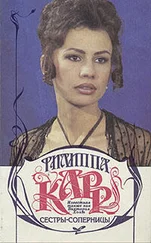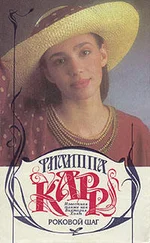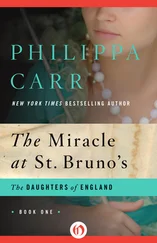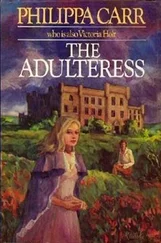It was a fine one-grander than any I had ever seen. A line of silken flags adorned it; it was gaily colored and I saw people in it; the sun caught the jewels on their doublets so that they glittered.
I thought my father was about to pick me up and go back to the house.
"Oh, no," I protested.
He did not seem to hear me, but I was aware of his hesitation and he seemed different from his usual strong and clever self. Young as I was, I sensed a certain fear.
He stood up, holding me even more firmly. The barge was very near now; the music was quite loud; I heard the sound of laughter and then I was aware of a giant of a man-a man with red-gold beard and a face that seemed enormous and on his head was a cap that glittered with jewels; on his doublet gems shone too. Beside him was a man in scarlet robes, and the giant and the man in red stood very close.
My father took off his hat and stood bareheaded. He whispered to me: "Curtsy, Damask.”
I hardly needed to be told. I knew I was in the presence of a godlike creature.
My curtsy appeared to be a success for the giant laughed pleasantly and waved a glittering hand. The barge passed on; my father breathed more easily but he still stood with his arms tightly about me staring after it.
"Father," I cried, "who was that?”
He answered: "My child, you have just been recognized by the King and the Cardinal.”
I had caught his excitement. I wanted to know more of this great man. So he was the King. I had heard of the King; people said his name in hushed tones. They revered him; they worshiped him as they were supposed to worship God alone. And more than anything they were afraid of him.
My parents, I had already noticed, were wary when they spoke of him, but this encounter had caught my father off his guard. I was quick to realize this.
"Where are they going?" I wanted to know.
"They are on their way to Hampton Court. You have seen Hampton Court, my love.”
Beautiful Hampton! Yes, I had seen it. It was grand and imposing, even more so than my father's house.
"Whose house is it, Father?" I asked.
"It is the King's house.”
"But his house is at Greenwich. You showed me.”
"The King has many houses and now he has yet another. Hampton Court. The Cardinal has given it to him.”
"Why, Father? Why did he give the King Hampton Court?”
"Because he was forced to.”
"The King... stole it?”
"Hush, hush, my child. You speak treason.”
I wondered what treason was. I remembered the word but I did not ask then because I was more interested in knowing why the King had taken that beautiful house from the Cardinal. But my father would tell me no more.
"The Cardinal did not want to lose it," I said.
"You have too old a head on those shoulders," said my father fondly.
It was a fact of which he was proud. He wanted me to be clever. That was why even at such an age I already had a tutor and knew my letters and could read simple words.
Already I had felt the burning desire to know-and this was applauded and encouraged by my father so I suppose I was precocious.
"But he was sad to lose it," I insisted. "And, Father, you are sad too. You do not like the Cardinal to lose his house.”
"You must not say that, my dearest," he said. "The happier our King is the happier I as a true subject must be and you must be....”
"And the Cardinal must be," I said, "because he is the King's subject too.”
"You're a clever girl," he said fondly.
"Laugh, Father," I said. "Really laugh with your mouth and your eyes and your voice.
It is only the Cardinal who has lost his house.... It is not us.”
He stared at me as though I had said something very strange and then he spoke to me as though I were as old and wise as Brother John who came to visit him sometimes from St. Bruno's.
"My love," he said, "no one stands alone. The tragedy of one could well be the tragedy of us all."
I did not understand the words. I did know what tragedy was and silently puzzled over what he had said. But I did remember it later and I thought how prophetic were his words that day by the river.
Then he diverted my attention. "Look how pretty the loosestrife is! Shall we gather some for your mother?”
"Oh, yes," I cried. For I loved gathering flowers and my mother was always so pleased with what I found for her; so as I made a nosegay of purple loosestrife with the flowers we called cream-and-codlings I forgot the sadness the sight of the King and the Cardinal in the royal barge together had wrought in my father.
That had been a terrible summer. News came to us that the plague was raging through Europe and that thousands had died in France and Germany.
The heat was terrible and the fragrance of the flowers of the garden was overlaid by the stench that came off the river.
I heard what was happening from Keziah. I had discovered that I could learn far more from her than from my parents, who were always cautious in my hearing and a little afraid, while they were immensely proud, of my precocity.
She had been along to the Chepe and found that several of the shops were boarded up because their owners had fallen victim to the sweating sickness.
"The dreaded sweat," she called it and rolled her eyes upward when she spoke of it.
It carried off people in the thousands.
Keziah went to the woods to see Mother Salter whom everyone was afraid of offending; at the same time she was said to have cures for every kind of ailment. Keziah was on very good terms with her. She would proudly toss her thick fair curly hair, her eyes would crinkle with merriment and she would smile knowingly when she talked of Mother Salter. "She's my old Granny," she told me once in sudden confidence.
"Then are you a witch, Kezzie?" I asked.
"There's some that have called me so, little 'un." Then she made claws of her hand and prowled toward me. "So you'd better be a good girl or I'll be after you." I squealed with the delight Keziah could arouse in me and pretended to be afraid. With her laughter, sometimes sly, sometimes warm and loving, Keziah was for me the most exciting person in the household. She it was who first told me of the miracle and one day when we were out walking she said that if I were a good girl she might be able to show me the Child.
We had come to that wall where our lands joined those of the Abbey. Keziah hoisted me up. "Sit still," she commanded. "Don't dare move." Then she climbed up beside me.
"This is his favorite place," she said. "You may well see him today.”
She was right. I did. He came across the grass and looked straight up at us perched on the wall.
I was struck by his beauty although I did not realize it then; all I knew was that I wanted to go on looking at him. His face was pale; his eyes the most startling dark blue I had ever seen; and his fair hair curled about his head. He was taller than I and even at that age there was an air of superiority about him which immediately overawed me.
"He doesn't look holy," whispered Keziah, "but he's too young for it to show.”
"Who are you?" he asked, giving me a cold direct stare.
"Damask Farland," I said. "I live at the big house.”
"You should not be here," answered the Child.
"Now, darling, we've a right to be here," replied Keziah.
"This is Abbey land," retorted the boy.
Keziah chuckled. "Not where we are. We're on the wall.”
The boy picked up a stone and looked about him as though to see if he would be observed throwing it at us.
"Oh, that's wicked," cried Keziah. "You wouldn't think he was holy, would you? He is though. Only holiness doesn’t show till they get older. Some of the saints have been very naughty boys. Do you know that, Dammy? It's in some of the stories. They get their halos later on.”
Читать дальше







